R | 1h 37m | Sports, Documentary | July 14, 2023
“Black Ice” is a Canadian documentary, intended as a wake-up call to Canada about Canada’s black and indigenous Canadians in Canadian hockey.
For Canadians, it’ll be a rather shocking topic. As Americans, while not exactly “ho-hum,” the subject matter is not nearly as much of a gut-punch to us, due to our having been down this road so many times before.
Sarah Nurse of Canada’s national women’s hockey team won an Olympic gold medal playing for Canada at the 2022 Beijing Olympics, setting records for most assists (13) and points (18) in a single tournament in “Black Ice.” (Roadside Attractions)
From the pre-Civil War South through Jim Crow and well into the 1960s, this sort of thing was nearly constant in America: “Black men aren’t intelligent enough to play quarterback,” “Black people can’t swim,” “Can’t play golf,” and so on. America’s fresh out of things black folks can’t be, but Canada is still learning.
Interestingly, the two things most fervently embraced by Canadians as being quintessential to the Canadian identity: 1) hockey, and 2) tolerance, but “Black Ice” depicts Canadians at hockey games, indulging in just as much hate-fueled, raw intolerance, and racism as the American Deep South during Jim Crow.
Former NFL player Wayne Simmonds (L) and an up-and-coming young goalie in “Black Ice.” (Roadside Attractions)
‘Black Ice’
“Black Ice” features firsthand accounts by a variety of black Canadian hockey players, talking about the various ways they all fell in love with the game as little kids, and about how that love was wrested away and, in some cases, extinguished by the racism they experienced from hockey fans, coaches, and fellow Caucasian players.
It also features a historical exploration into Canadian hockey’s roots, dating back to the mid-1800s. Director Hubert Davis tackles racist patterns that span generations and which continue to influence hockey as well as the country of Canada as a whole.
There’s something in “Black Ice” for both sports fans and history buffs. We, Americans, who thought hockey was an all-white sport with no players of color, are introduced to the fact that this very widespread view is largely false and has been since the sport’s inception.
How It Started
“Black Ice” depicts how hockey has been a major part of black Canadian history, dating back to the Nova Scotia-based Colored Hockey League of the 1800s. Herb Carnegie, still considered one of the best to ever play the game, was never signed by a National Hockey League (NHL) team because no owner wanted to be responsible for breaking the (black) ice on the color barrier.
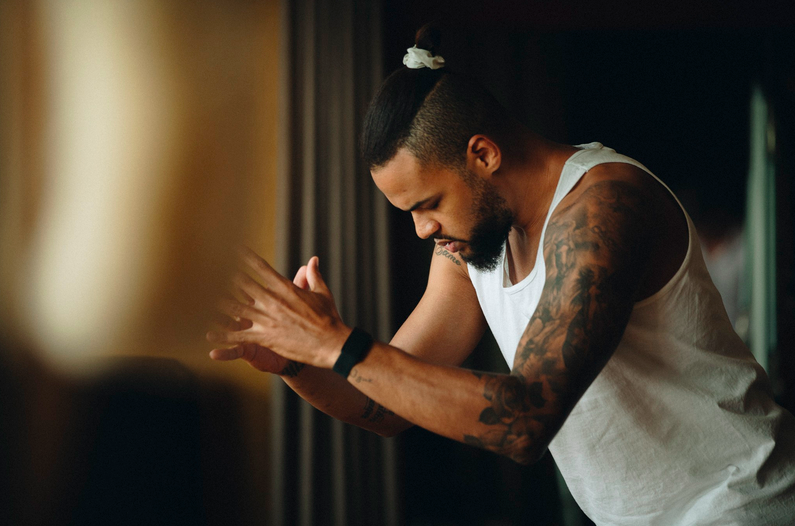 Former National Hockey League player Akim Aliu in “Black Ice.” (Roadside Attractions)
Former National Hockey League player Akim Aliu in “Black Ice.” (Roadside Attractions)
In 2019, former NHL player Akim Aliu (looking quite a bit like movie star Jason Momoa) opened the floodgates on the hidden reservoir of racism in Canadian hockey. He accused coach Bill Peters of the Calgary Flames of calling him racial slurs during practice, when Peters coached him in a minor league team ten years prior.
One player describes how, when he was 10-years old, a group of white parents started collectively jumping up and down and hooting like chimpanzees at the sight of him. Philadelphia Flyers’s Wayne Simmonds was pelted with a banana during an exhibition game. Every player interviewed has an N-word story, and it usually started when they were little kids, as the only black child in the locker room and on the ice.
More subtly, there’s an ingrained history of Canadian hockey coaches insinuating in roundabout ways that black players aren’t smart enough to be allowed in scoring positions, but more suited to brawling, enforcer roles. A popular code-euphemism for this is that black players are “uncoachable.”
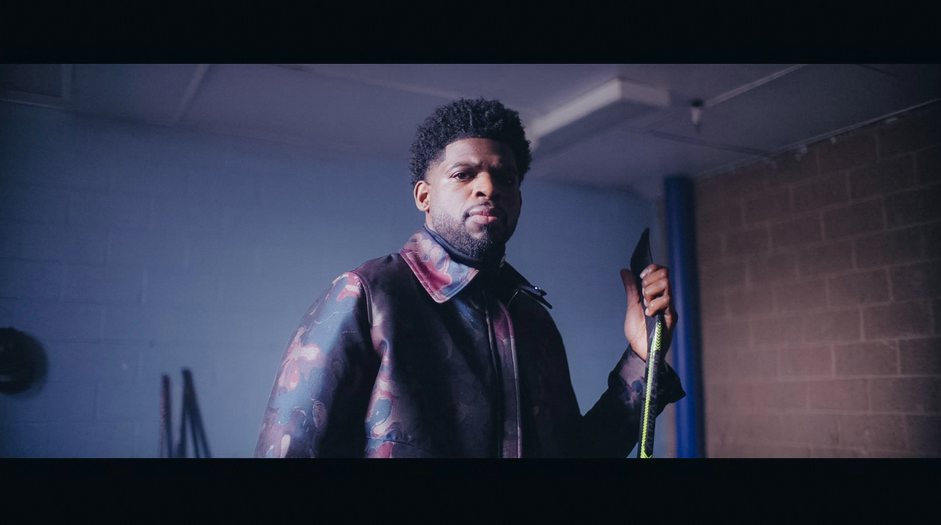 Canadian former professional ice hockey defenseman P. K. Subban, who played 13 seasons in the NHL with the Montreal Canadiens, Nashville Predators, and New Jersey Devils in “Black Ice.” (Roadside Attractions)
Canadian former professional ice hockey defenseman P. K. Subban, who played 13 seasons in the NHL with the Montreal Canadiens, Nashville Predators, and New Jersey Devils in “Black Ice.” (Roadside Attractions)
Overall
“Black Ice” shows that despite Canadian lip service to tolerance, racism is not a problem that stops at the U.S.-Canada border. Debra Thompson, a McGill University professor, notes that it “pushes at the boundaries of the Canadian imagination” to acknowledge the concept of systemic racism, and therefore many Canadians politely refuse to do so. My problem with the film is that terms like “systemic racism” that currently rage in this woke era are Marxist in origin; they are meant to divide and conquer the West, and it’s dangerous to paint this issue with too wide a brush.
It’s quite possible the majority of Canadians practice more tolerance than their Yankee cousins. Or maybe it’s the case that Americans in the lower 48 tell the truth more. Either way, the stories told here would probably “hold up in court” for making a case that the Canadian hockey system, specifically, is, in fact, systemically racist. And that’s not surprising in the least. Human beings are territorial animals, and when God is not present, things get ugly quickly.
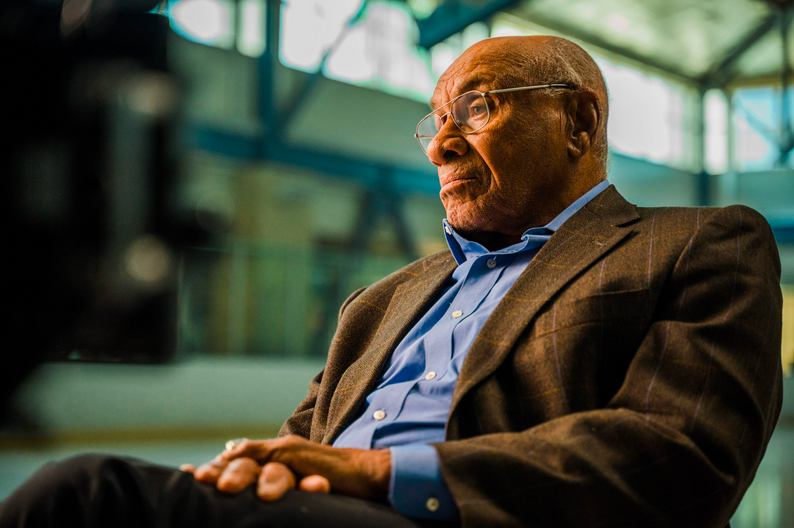 NHL legend Willie O’Ree being interviewed in “Black Ice.” (Roadside Attractions)
NHL legend Willie O’Ree being interviewed in “Black Ice.” (Roadside Attractions)
The most moving thing about “Black Ice” for Americans to see is that black Canadians don’t have the survival-based, centuries-old, emotionally hardened shell that black Americans have. Black Canadians go for most of their lives without hearing the N-word, unlike in the states where it’s a culturally embedded term to this day, anywhere outside of a major city.
And so to see in “Black Ice” what raw hatred does to innocent children who simply knew they loved the game of hockey when they put on skates at the age of 3 is sad. To see a black man at the age of 80, cry tears of pain at such memories is to feel shame for humanity, and our increasingly God-less society.
But time heals all wounds. Eventually, hopefully, peace will reign in the world’s hockey rinks. Sort of. Because hockey is seriously violent. Which is why it’s fun.
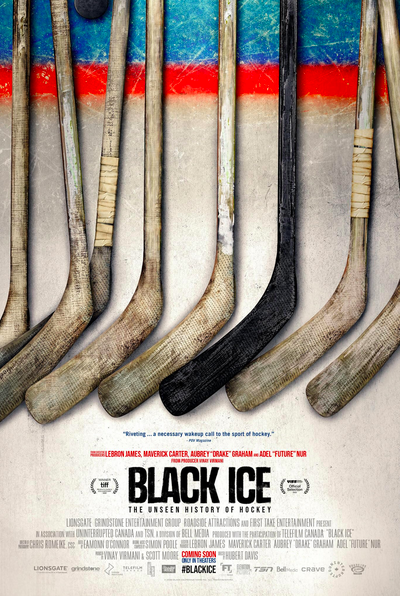 Poster for “Black Ice.” (Roadside Attractions)
Poster for “Black Ice.” (Roadside Attractions)
‘Black Ice’
Documentary
Director: Hubert Davis
MPAA Rating: R
Running Time: 1 hour, 36 minutes
Release Date: July 14, 2023
Rating: 4 out of 5 stars
Would you like to see other kinds of arts and culture articles? Please email us your story ideas or feedback at features@epochtimes.nyc

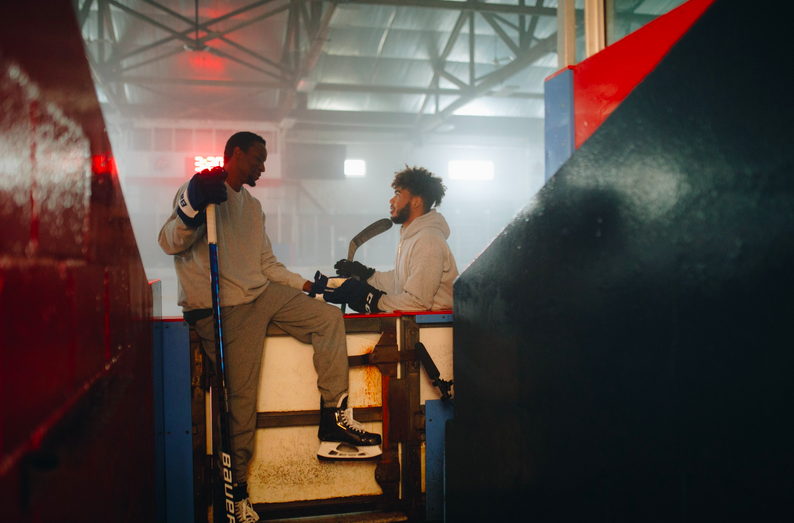 Former NFL player Wayne Simmonds (L) and an up-and-coming young goalie in “Black Ice.” (Roadside Attractions)
Former NFL player Wayne Simmonds (L) and an up-and-coming young goalie in “Black Ice.” (Roadside Attractions)